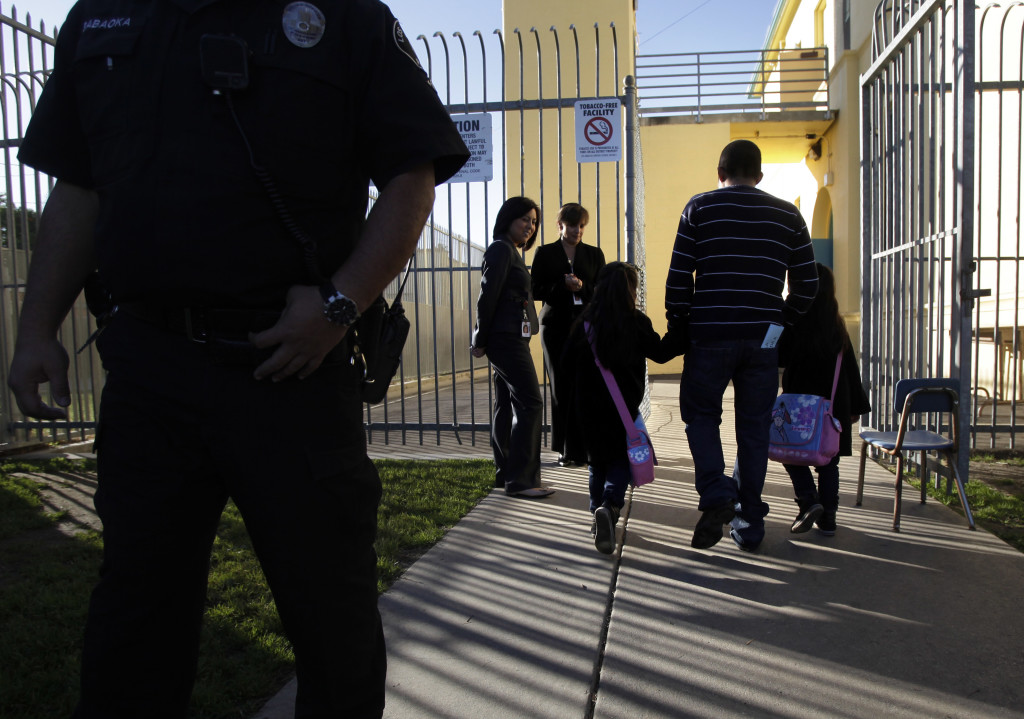Is Immigration Program Hampering Investigation into School Abuse Scandal?

February 13, 2012
Share
At least two families of students at Miramonte Elementary School in Los Angeles — where in recent weeks two teachers have been accused of lewd conduct and the entire staff has been temporarily replaced — are avoiding reporting allegations of abuse to police because of concerns over their immigration status, according to a new report from KPCC, Southern California’s public radio station.
The parents’ fears, reports Leslie Berenstein Rojas, can be traced to alienation over programs like Secure Communities, the Obama administration’s controversial immigration program which tracks immigration violators via fingerprint data.
Police say they’ve made it clear that they won’t ask parents about immigration status in connection with Miramonte:
“They have Sheriff Lee Baca’s word that there will not be prosecution or even inquiries into anybody’s legal status in this country,” [Sgt. Dan] Scott said. “We are seeking victims, witnesses, or anybody that has information about this case to please come forward to the Sheriff’s Special Victims Unit, which is our normal process. We will not ask their legal status. The Sheriff specifically wants that message out: We will not be inquiring as to their legal status.”
But one father explained to Rojas why he decided to go to a lawyer rather than police:
“That is what they say, but it’s one thing that they say it and another that they do it,” said the father of a 10-year-old female student at the school, a man named Raymundo who was reluctant to use his last name because he is undocumented. “I don’t trust them. If I had a ferocious pit bull at home, and I told you to come in, it won’t bite, what would you do?”
We reported on the anxiety caused by Secure Communities in our recent film Lost in Detention. “When I deal with the Latino community in Waukegan [and] the immigrant communities throughout Lake County, there is fear that’s running through these communities,” Lake County, Ill., Sheriff Mark Curran told FRONTLINE. “They know the horror story of their uncle or their brother who committed the most ticky-tack of offenses, got incarcerated as a result and is now being deported. It just sends chills through their spine, … because they’ve seen the effects of that.”
Curran was initially open to Secure Communities, but found the program problematic, in part because it made effective law enforcement difficult in his community. “It’s not a good recipe for the future of America. It makes us a lesser country,” says Curran about breaking up nuclear families.
The Department of Homeland Security, the parent agency for Immigration and Customs Enforcement [ICE], has programs for people who are victims of abuse. The U Visa is designed for “victims of crimes who have suffered substantial mental or physical abuse and are willing to assist law enforcement and government officials in the investigation or prosecution of the criminal activity.” In addition, under a prosecutorial discretion memo [PDF] released by ICE last summer, “a victim of domestic violence, human trafficking, or other crime” may be deemed less of a deportation priority than a serious criminal or repeat border violator.
Sgt. Dan Scott of the Los Angeles County Sheriff’s Department told Rojas that anyone who comes forward with information regarding the Miramonte allegations will not be fingerprinted. But that doesn’t seem to reassure people like Raymundo.
“I wanted to talk to the director and they told me the director is occupied, so they told me to talk to a sheriff,” he said. “But I didn’t want to. I thought they were going to ask me for identification. So I left the school.”
Related Documentaries
Latest Documentaries
Related Stories
Related Stories
Explore
Policies
Teacher Center
Funding for FRONTLINE is provided through the support of PBS viewers and by the Corporation for Public Broadcasting, with major support from Ford Foundation. Additional funding is provided the Abrams Foundation, Park Foundation, John D. and Catherine T. MacArthur Foundation, Heising-Simons Foundation, and the FRONTLINE Trust, with major support from Jon and Jo Ann Hagler on behalf of the Jon L. Hagler Foundation, and additional support from Koo and Patricia Yuen. FRONTLINE is a registered trademark of WGBH Educational Foundation. Web Site Copyright ©1995-2025 WGBH Educational Foundation. PBS is a 501(c)(3) not-for-profit organization.





















